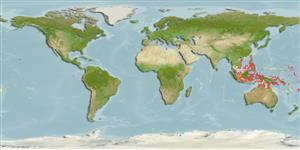>
Gobiiformes (Gobies) >
Gobiidae (Gobies) > Gobiinae
Etymology: Asterropteryx: Greek, a = with + Greek, sterros, -a, -on = consistent + Greek, pteryx = fin (Ref. 45335).
Environment: milieu / climate zone / depth range / distribution range
Ecologia
marinhas associadas(os) a recifes; intervalo de profundidade 6 - 30 m (Ref. 31115). Tropical
Western Central Pacific: Indonesia, Papua New Guinea, and the Indo-Australian Archipelago.
Tamanho / Peso / Idade
Maturity: Lm ? range ? - ? cm
Max length : 2.3 cm SL macho/indeterminado; (Ref. 31115)
Descrição suscinta
Morfologia | Morfometria
Espinhos dorsais (total): 7; Raios dorsais (total): 10; Espinhos anais 1; Raios anais : 9. Body whitish with a broad dark brown stripe from snout to base of caudal fin. Preopercle spines, 4-5. Ctenoid scales on head, cheek, opercle, and rest of the body except on pectoral base and prepelvic region where it is cycloid (Ref. 31115); characterized further by absence of prolonged spines; longitudinal scale series 24; 4-5 weak spines on rear edge of preopercle, similar size all spines; rounded caudal fin; depth of body 3.3-4.0 in SL (Ref. 90102).
Inhabits rubble bottoms in lagoons and sheltered coastal reefs. Typically hovers a short distance above the bottom, apparently to feed on zooplankton (Ref. 31115). Solitary or in small group (Ref 90102).
Ciclo de vida ou comportamento de acasalamento
Maturidade | Reprodução | Desova | Ovos | Fecundidade | Larvas
Allen, G.R. and P. Munday, 1995. Description of four new Gobies (Gobiidae) from the Western Pacific Ocean. Rev. Fr. Aquariol. 22(3-4):99-104. (Ref. 31115)
Status na Lista Vermelha da UICN (Ref. 130435)
Ameaça para os humanos
Harmless
Uso pelos humanos
Mais informação
Nomes comunsSinônimosMetabolismoPredadoresEcotoxicologiaReproduçãoMaturidadeDesovaAgregação de desovaFecundidadeOvosDesenvolvimento dos ovos
Idade/TamanhoCrescimentoPeso-comprimentoComprimento-comprimentoFrequências de comprimentoMorfometriaMorfologiaLarvasDinâmica larvalRecrutamentoAbundânciaBRUVS
ReferênciasAquaculturaPerfil para aquaculturaEstirpesGenéticaElectrophoresesHereditariedadeDoençasProcessamentoNutrientsConversão de massa
ColaboradoresFotosStamps, Coins Misc.SonsCiguateraVelocidadeTipo de nataçãoÁrea branquialOtólitosCérebrosVisão
Ferramentas
Relatórios especiais
Baixar XML
Fontes da internet
Estimates based on models
Preferred temperature (Ref.
123201): 27 - 29.3, mean 28.7 °C (based on 1066 cells).
Índice de diversidade filogenética (Ref.
82804): PD
50 = 0.5039 [Uniqueness, from 0.5 = low to 2.0 = high].
Bayesian length-weight: a=0.00708 (0.00333 - 0.01504), b=3.09 (2.92 - 3.26), in cm total length, based on LWR estimates for this (Sub)family-body shape (Ref.
93245).
Nível Trófico (Ref.
69278): 3.4 ±0.45 se; based on food items.
Resiliência (Ref.
120179): Elevada, tempo mínimo de duplicação da população menor que 15 meses (Preliminary K or Fecundity.).
Fishing Vulnerability (Ref.
59153): Low vulnerability (10 of 100).
Nutrients (Ref.
124155): Calcium = 413 [181, 1,403] mg/100g; Iron = 1.81 [0.75, 4.07] mg/100g; Protein = 17.4 [15.3, 19.3] %; Omega3 = 0.108 [0.033, 0.326] g/100g; Selenium = 33.2 [9.1, 107.5] μg/100g; VitaminA = 189 [41, 912] μg/100g; Zinc = 4.15 [2.21, 7.04] mg/100g (wet weight);
